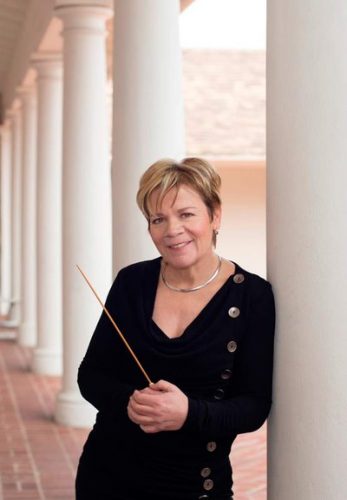
When the Eugene Symphony chose a young, little-known conductor named Marin Alsop as its music director in 1989, both she and the orchestra were at best marginal micro-planets orbiting the farthest reaches of the American classical music solar system.
By the time Alsop left in 1996, the New York native was one of classical music’s rising stars, crashing through a series of glass ceilings in a seriously sexist classical music milieu to score a handful of increasingly prestigious gigs with orchestras around the world, from São Paulo to Scotland.
This journey has culminated (so far) in her becoming the first female music director of a major American orchestra, the Baltimore Symphony, in 2007, where she continues to innovate in both programming and connecting classical music to broader communities. Alsop’s national reputation also benefited from her collecting a MacArthur “genius grant” fellowship and becoming National Public Radio’s principal ’splainer.
Meanwhile, the Eugene Symphony (after Alsop vaulted it to national attention at a national symphony conference in Portland) became a prime intermediate stop for young conductors on the make — the final regional stepping stone to high-level gigs for her successors Miguel Harth-Bedoya (in Fort Worth) and Giancarlo Guerrero (in Nashville).
Alsop, who turns 60 this fall, returns to Eugene, where she’s maintained connections and occasional performances despite a dizzying international schedule guest-conducting most of the major orchestras, making a series of well-regarded Naxos recordings and leading California’s new music showcase, the Cabrillo Festival (from which she’s stepping down this summer after 25 years).
The ESO conductor laureate leads her old band for SymFest: Marin Alsop Celebrates Eugene 7:30 pm Saturday, April 2, at the Hult Center and features some of her favorites: American composer John Adams’s propulsive Short Ride in a Fast Machine, her mentor Leonard Bernstein’s powerful On the Waterfront film score, the famous adagio from Mahler’s never-completed 10th symphony and American jazz and classical pioneer James P. Johnson’s Victory Stride.
Alsop honed her successful formula in Eugene — specifically, her friendly approachability to community members, eagerness and adeptness at explicating and demystifying classical music in terms anyone can understand, and her commitment to contemporary American music.
I’ve seen Alsop rehearse with and conduct the ESO, Cabrillo Festival and even the notoriously obstreperous New York Philharmonic and never lose her cool or focus. Rejecting the imperiousness of old-guard European conductors, she’s a musical leader for the 21st century, and it’s a joy to have this great musician back where her career really took off.
Alsop is renowned for championing music by American composers of her generation, including one of the best, Christopher Rouse, whose music is on the Oregon Percussion Ensemble’s free program 5 pm Friday, April 1, at the University of Oregon’s Aasen-Hull Hall, along with music by John Cage and Maurice Ravel. It’s all part of the Northwest Percussion Festival, which includes a 7 pm concert that same evening at Beall Concert Hall starring Mexican vibraphonist and composer Victor Mendoza. The festival also includes a free concert 8 pm Saturday, April 2, at Beall featuring various percussion ensemble directors. And the UO hosts more new music 7:30 pm Tuesday, April 5, when flutist Molly Barth and pianist Ednaldo Borba perform at Aasen-Hull.
If your tastes run to earlier music, check out Byrdsong Renaissance Consort’s free concert —6 pm Friday, April 1, at the Eugene Library. The quintet sings and plays 16th-18th-century European music on historical recorders, viols, violin, flutes and harpsichord.